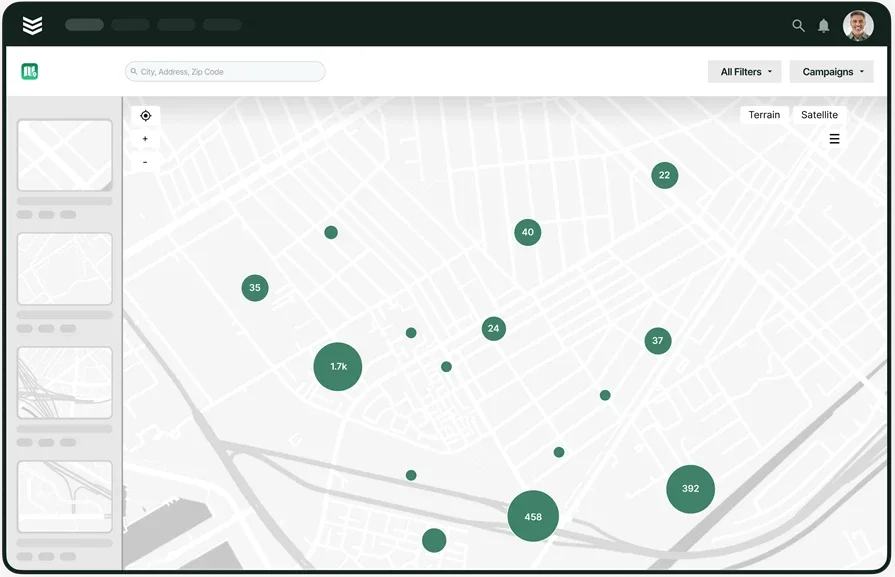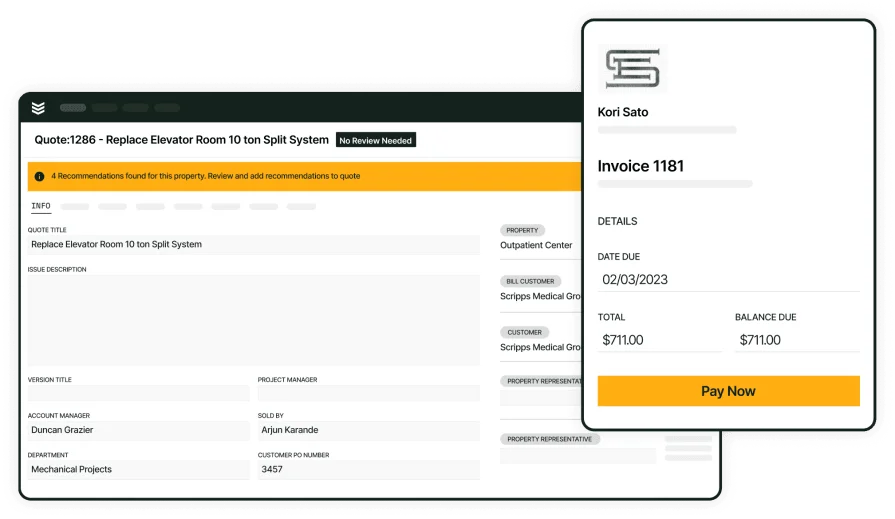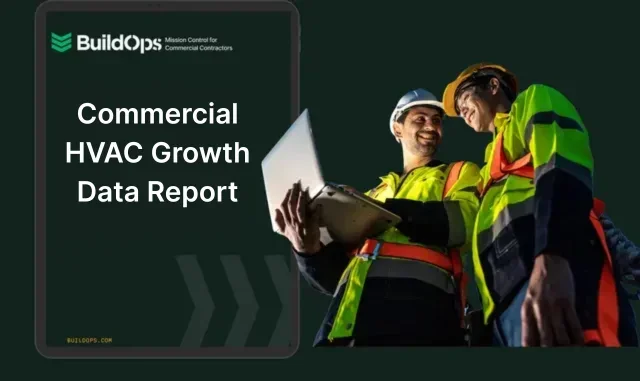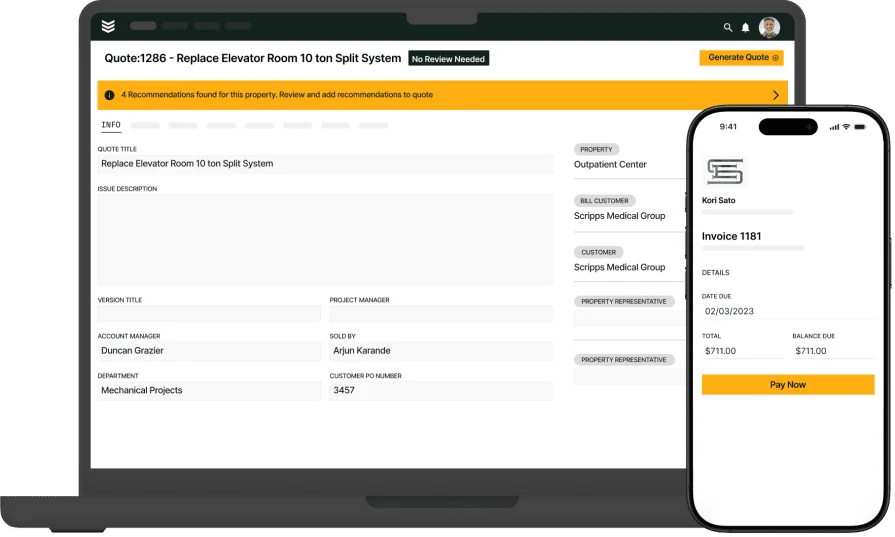Quoting jobs in the commercial HVAC industry takes more than a handshake and a number scribbled on paper. Between complex systems, tight margins, and clients expecting fast, polished estimates—it’s easy for things to slip. That’s where HVAC proposal software comes in. It lets you build accurate, professional proposals in minutes, not hours. And when it’s part of a larger HVAC software platform, everything stays connected—from estimate to invoice to job tracking.
Whether you're quoting a new installation or putting together a maintenance contract, proposal tools give your team the speed and consistency needed to compete—and win—in today’s market. In this guide, we’ll cover what features to prioritize, compare the top tools for different business types, and show how proposal software can help you land bigger jobs with less friction.
- Choosing HVAC proposal software for contractors
- 6 key features that make proposal software worth it
- 6 best HVAC proposal software for different types of contractors
- 5 ways proposal tools help you win jobs faster
- 4 FAQs about HVAC proposal software
Let’s start by looking at what makes a proposal platform effective—and how to pick one that actually supports the way commercial HVAC teams work in the field and at the office.
How to choose an HVAC proposal software for contractors
Finding a proposal tool that actually fits the way your team works starts with asking the right questions. HVAC contractors aren’t dealing with one-off fixes or cookie-cutter quotes. You’re juggling install specs, labor estimates, equipment pricing, timelines, and customer expectations—all while trying to keep your crew moving. The software you choose has to handle that level of complexity without slowing you down.
Start by breaking down how your proposals are currently built, shared, and tracked. Use the list below to evaluate your workflow and figure out what kind of tool can actually keep up with your pace.
- Workflow ownership - Who’s building the proposals—technicians in the field or staff in the office? Do they need mobile access or integrations with pricing databases? Are multiple people involved, or is it a one-person job?
- Turnaround time - How long does it take your team to send out a quote after the initial request? Is your current process causing delays that cost you jobs? Can the software help cut hours off each proposal?
- Job type and complexity - Are you quoting small service jobs, large installs, or both? Can your current tool handle multi-phase proposals or bundled options? Does it scale with your project size?
- Repeatability - Are you writing every proposal from scratch, or pulling in templates and pricing from previous jobs? Can you save common scopes of work or parts lists to reuse later? Is there a library to help standardize estimates?
- Follow-up and visibility - How do you track what happens after you send a proposal? Do you know when a client opens it? Can you automate reminders or updates? Is your sales team guessing or actually following a system?
- Features - Does it support branded templates, digital signatures, and real-time pricing? Can you attach supporting docs, drawings, or photos? Does it integrate with your CRM, accounting, or service software?
Once you’ve mapped these out, it’s easier to zero in on the tools that actually help—not just check boxes. Up next, we’ll break down the features that make proposal software a no-brainer for HVAC contractors.
6 key features that make HVAC proposal software worth it
The best software HVAC proposal writers can use gives your team faster ways to build, customize, send, and track every job-winning estimate. Whether you’re quoting a rooftop replacement or routine maintenance, these six features make the difference between landing work and losing time.
1. Proposal templates with customizable scope of work
Proposal templates let you standardize your most common jobs—unit replacements, maintenance agreements, retrofits—and reuse them again and again. Instead of starting from scratch, your team can adjust quantities, change part numbers, and send accurate, polished estimates within minutes.
For example, on a busy Tuesday morning, a tech wraps up a rooftop inspection and sends job specs back to the office. Your team pulls up a saved template, updates the scope, and gets the proposal to the client before lunch. This kind of speed is only possible with estimating software for HVAC contractors that adapts to your team’s quoting process.
2. Built-in equipment and pricing libraries
Proposal software should link directly to your real-time parts lists and labor rates. This ensures your team pulls in the correct models, avoids pricing mistakes, and builds quotes that match what’s actually available.
Let’s say a property manager asks for a two-tiered quote—standard and high-efficiency options. Instead of digging through spreadsheets or calling vendors, your team builds both options directly from your price library. That kind of accuracy comes from CRM tools for field service contractors that keeps your estimates clean and competitive.
3. Mobile access for field techs and estimators
Mobile access gives your field teams the ability to start proposals from anywhere. Techs or estimators can add notes, upload photos, and start drafts without needing to return to the office.
Here’s a scenario: your estimator is walking through a facility with the customer, gathering details for a retrofit. Instead of jotting things down to enter later, they use their tablet to build the framework of the proposal right then and there. That’s the value of mobile-ready proposal tools for HVAC contractors that sync field input with the office in real time.
4. Digital signatures and customer approval tracking
A good proposal tool lets customers sign directly on the quote—no printing, scanning, or chasing paperwork. Once signed, your team gets notified, and the job can move into scheduling without delay.
Consider this: your office sends a proposal for a multi-zone VRF system late in the day. The building engineer signs it that evening from their phone. You get the approval instantly, and the job gets queued up first thing in the morning. That’s only possible with a digital payment tool built into HVAC software.
5. Connected workflows from proposal to invoice
The best proposal software connects seamlessly to your scheduling and billing systems, so approved quotes flow straight into the job queue and invoice schedule. This reduces duplicate entry and makes sure nothing falls through the cracks.
Picture your team winning a bid for a complex install. Once signed, that proposal automatically triggers job creation, crew assignment, and invoicing—without the team retyping anything. It works when you have connected quoting and invoicing workflows for HVAC contractors that link everything together.
6. Real-time reporting and proposal tracking
You need to know which quotes are stuck, which are signed, and how fast your team is closing jobs. Built-in reporting shows how long each proposal sits open, which estimator is closing the most deals, and where you’re losing momentum.
Let’s say you want to follow up on stalled quotes from last week. Instead of guessing, your team pulls up a report showing all open proposals by age and value. That kind of visibility comes from real-time reporting and tracking tools in HVAC proposal software that give you a full view of your sales pipeline.

Explore our proposal software
Land—and closeout—more jobs by creating winning project proposals.
Other valuable proposal software features for HVAC contractors
Beyond the core tools of an HVAC proposal builder, some features might not get the spotlight—but they still make a big impact on how your team sells, quotes, and wins work. These added capabilities help HVAC businesses handle recurring contracts, streamline internal handoffs, and stay on top of every moving part in the proposal-to-job process. Here are a few extras worth looking for:
- Service agreement tracking: Stay on top of recurring contract renewals, warranties, and maintenance terms with automated reminders built into service agreement tools for HVAC.
- Sales pipeline visibility: Monitor open quotes, deal stages, and close rates with full visibility into your team's pipeline using pipeline tracking features.
- Integrated scheduling: Convert accepted proposals directly into jobs and assign crews without re-entering any data through scheduling tools built for HVAC software.
- Fleet-aware quoting: Coordinate equipment delivery, crew availability, and proposal timelines with insights powered by fleet management tools.
- Time tracking integration: Tie proposals to job labor costs more accurately by syncing with time tracking features for HVAC teams.
6 best HVAC proposal software for different types of contractors
Not every HVAC proposal maker tool fits the same kind of contractor. Some are better for big commercial teams. Others are built for fast residential quotes or one-person shops. Here’s a breakdown of top options—so you can find the one that matches how your team actually works.
1. Best HVAC proposal software for commercial: BuildOps
BuildOps is designed specifically for commercial HVAC contractors who manage complex proposals across multi-phase installs, service contracts, and large-scale retrofits. Its quoting platform lets teams build detailed proposals with custom scopes of work, live pricing, and digital approval workflows—all in one system. Integrated with scheduling, invoicing, and CRM tools, BuildOps helps commercial contractors turn quotes into jobs without missing a beat. With BuildOps, teams stay connected from the field to the office, and proposals move faster.
How Pricing Works: To explore features and discover a solution that meets your needs, we provide weekly live demos and the opportunity to schedule a customized session.
Features Beyond Proposals:
- Integrated CRM and quoting tools: Manage customer data and build job-specific proposals with tracked histories and contact insights
- Digital signature and approval tracking: Send proposals electronically, collect customer signatures, and get notified the moment a job is approved
- Connected invoicing and job creation: Approved proposals can immediately generate jobs and link to invoices for a seamless transition
What Sets It Apart for Commercial: BuiltOps is tailored to the needs of commercial HVAC companies, from multi-site property managers to facility contracts. Its ability to handle complex scopes, equipment variations, and crew scheduling makes it ideal for large operations that need everything in sync.

Want to see BuildOps in action?
Upgrade your commercial quoting process so you land more jobs.
2. Best for residential: Housecall Pro
Image Source: Housecall Pro
Housecall Pro is a cloud-based solution aimed at residential HVAC contractors who need a fast and easy way to create and share proposals. The Sales Proposal tool includes prebuilt templates, optional upsell packages, and real-time quote tracking. Designed to be user-friendly, it allows techs in the field to build and present polished proposals straight from a mobile device. However, its simplicity comes at the cost of flexibility and customization, which may limit its effectiveness for larger or more complex commercial bids.
How Pricing Works: Housecall Pro offers tiered plans based on team size and features, with proposal tools included in higher-tier subscriptions.
Features Beyond Proposals:
- Customer-friendly quote builder: Present multiple pricing options and upsell packages with a visual interface
- Mobile proposal creation: Build and send estimates from the jobsite using a smartphone or tablet
- Online booking and invoicing: Once accepted, jobs can be booked and invoiced automatically within the same system
What Sets It Apart for Residential: Housecall Pro makes it easy for smaller teams to generate clean, professional-looking proposals in the field and close jobs faster without back-and-forth.
Compare Housecall Pro and BuildOps here to learn more about their features.
3. Best for general contractors: Jobber
Image Source: Jobber
Jobber is built for service providers who juggle HVAC work alongside plumbing, electrical, or other field trades. Its estimating tools allow users to create itemized quotes, apply custom markups, and send proposals digitally for customer approval. General contractors managing mixed trades will appreciate its job tracking and team scheduling capabilities. That said, HVAC-specific workflows may feel limited compared to software that’s fully tailored for the trade.
How Pricing Works: Jobber offers subscription-based pricing with estimating features available in its mid to upper-tier plans.
Features Beyond Proposals:
- Multi-trade estimating tools: Customize estimates based on trade, scope, and line items
- Client hub: Allow customers to review, approve, and manage proposals online
- Automated follow-ups: Get reminders and alerts when proposals are opened but not yet signed
What Sets It Apart for General Contractors: Jobber is a solid fit for contractors who manage HVAC as part of a broader service offering and need one system to handle it all.
4. Best for small service shops: Workiz
Image Source: Workiz
Workiz targets small to midsize HVAC teams looking for straightforward estimating tools that don’t require hours of setup. The platform allows techs to build proposals in the field, pull in service history, and collect e-signatures on the spot. It’s especially helpful for companies doing lots of quick-turn jobs like inspections, unit replacements, and cleanings. While the system is intuitive, it may lack deeper customization for advanced estimating needs.
How Pricing Works: Workiz provides monthly and annual pricing options, with proposal features included in the Pro and Ultimate plans.
Features Beyond Proposals:
- Quick-start templates: Build fast estimates using saved services and items
- Field-ready quoting tools: Techs can send, edit, and finalize proposals without leaving the jobsite
- Built-in e-signature: Close jobs on the spot with signature capture and automatic job creation
What Sets It Apart for Small Shops: Workiz is ideal for fast-moving HVAC shops that need to quote, book, and get approval in one visit without extra steps.
5. Best for independent contractors: Joist
Image Source: Joist
Joist is a lightweight, mobile-friendly tool built for independent HVAC contractors who need to create clean, professional proposals on the go. It allows users to build estimates, collect digital signatures, and invoice clients—all from a phone or tablet. It’s especially useful for solo contractors juggling multiple roles and looking to keep things simple. However, it lacks deeper integrations and advanced scheduling features that larger teams may need as they grow.
How Pricing Works: Joist offers a free version with core proposal tools, and paid plans unlock additional features like branding, reporting, and QuickBooks integration.
Features Beyond Proposals:
- Mobile estimate creation: Build and send proposals from the field without a laptop
- Branded templates: Customize your proposals with logos and company details
- Integrated invoicing and payments: Turn signed proposals into invoices and get paid faster
What Sets It Apart for Independent Contractors: Joist keeps things lean and simple for one-person operations, making it easy to quote work professionally without dealing with bulky systems.
6. Best for teams offering maintenance contracts: FieldEdge
Image Source: FieldEdge
FieldEdge is built for HVAC contractors who focus on recurring work—especially teams that manage a large base of service agreements. Its proposal features let users quote new equipment, upgrades, or add-ons while tying those quotes directly into maintenance contracts. If your team handles long-term customer relationships, FieldEdge gives you the tools to keep proposals, agreements, and job scheduling aligned. That said, the system can be overwhelming for smaller companies with limited admin support.
How Pricing Works: Pricing is customized based on business size, user count, and selected features, with proposal tools included in the base platform.
Features Beyond Proposals:
- Contract-linked quoting: Attach proposals to ongoing service agreements or renewal periods
- Recurring job generation: Automatically schedule work after a proposal is accepted
- Customer asset tracking: Use past service data to guide proposal recommendations
What Sets It Apart for Maintenance-Focused Teams: FieldEdge helps HVAC contractors build long-term value through service agreements by keeping quotes and contracts connected.

Check out the HVAC growth report
Get insights into how leading HVAC pros grow and scale their business.
5 ways HVAC proposal tools help you win jobs faster
When your team is quoting multiple jobs a week—or even a day—the way you build, send, and track proposals matters. HVAC proposal software doesn’t just make quoting easier. It removes roadblocks that slow down approvals, confuse customers, or leave money sitting in your pipeline. These are the benefits that actually move the needle in the field.
1. Faster turnaround means fewer lost jobs
Speed is everything when it comes to closing. If your proposal takes too long, chances are the customer already signed with someone else. Proposal software gives your team the tools to build and send polished quotes in hours—not days—so you can stay competitive without cutting corners. For example, when a long-time client calls requesting an urgent system replacement quote, your team can send over a full proposal with pricing, scope, and options that same day.
2. Easier upselling without the awkward pitch
Built-in upsell options—like good-better-best packages or optional add-ons—make it easier to show value without turning your techs into salespeople. Instead of pushing upgrades verbally, techs can present options clearly and let the customer decide. Picture this: your tech finishes a site inspection, builds the estimate, and includes a higher-efficiency upgrade option right in the proposal. The customer picks the upsell with no extra pressure. If you’re trying to boost average ticket sizes, this best commercial HVAC software breakdown outlines how the right proposal tools help you close more—without the hard sell.
3. Less back-and-forth means faster approvals
When customers can open a proposal, review their options, ask questions, and sign—all from the same place—it cuts out the confusion that leads to delays. No more reprinting PDFs or clarifying unclear line items over email. Say a property manager receives a proposal with multiple options and clicks to approve the mid-range choice. Your team gets notified, schedules the job, and moves on—no extra follow-up needed. If smoother handoffs matter to your team, check out how HVAC invoicing software can help you understand how to connect proposals directly to billing and keep everything in sync.
4. Fewer errors mean more trust (and fewer callbacks)
Proposals built from templates and synced pricing reduce the risk of quoting the wrong model, price, or scope—mistakes that damage credibility and cost your team money. Imagine quoting a five-zone mini-split install with a custom configuration. Without a clean system, it’s easy to miss something. But when your proposal pulls from standardized templates and auto-fills pricing, everything’s dialed. Customers notice that level of detail—and they come back for it. If accuracy is slowing your sales cycle, consider tools that keep pricing and scopes standardized without the manual guesswork.
5. Stronger sales data means smarter decisions
Proposal software that tracks quote volume, close rates, and response time gives you real visibility into your sales process. You’ll see what’s working, where proposals get stuck, and who’s bringing in the most wins. For instance, you notice that one estimator closes 30% more jobs when proposals go out within two hours of a site visit. That kind of insight helps you tweak your process and train your team. If data-backed decisions are on your radar, it’s worth exploring platforms that offer built-in reporting tied directly to your proposal pipeline.
4 FAQs about HVAC proposal software
Got questions about HVAC proposal software? You’re not alone. Whether you're just starting to explore your options or already testing a few tools, these are some of the most common questions contractors ask before making the switch. Here's what you should know.
1. How much does HVAC proposal software cost?
Pricing usually depends on your team size, needed features, and whether it’s part of a full platform. Expect monthly or annual plans, often priced per user or feature set.
2. Can proposal software handle complex commercial quotes?
Yes—but not all tools are built for that level of detail. Commercial work often includes custom scopes, phased installs, or multi-site service agreements. You’ll want software that supports detailed line items, optional add-ons, and approval workflows. For more robust tools that can handle this type of work, check out this list of top HVAC service software platforms.
3. What’s the difference between proposal and bidding software?
Proposal software helps you send out estimates to customers for jobs you've already qualified for. Bidding software, on the other hand, is often used to compete for public or large-scale projects—where you’re one of several contractors submitting detailed bid packages. If you’re looking to get into competitive quoting, this resource on the HVAC bidding software explains how the two types of tools work.
4. Can I create and send proposals from the field?
With the right tool—yes. Many HVAC proposal platforms now offer mobile access, so your techs or estimators can build quotes, attach site photos, and even send proposals right from a phone or tablet. Just make sure the software syncs with your office system so everything stays organized.
Quoting work is one of the most important touchpoints in your relationship with a customer. Do it well, and it builds trust before you’ve even stepped on site. But if your proposal process is slow, inconsistent, or full of errors, it shows—and not in a good way. HVAC proposal software helps tighten that process, making it easier for your team to build, send, and track professional estimates without the usual bottlenecks.
Whether you're a one-person operation or managing dozens of techs, the tools you use to quote jobs should fit your workflow, not fight it. And if your team handles commercial installs, service agreements, or complex scopes, an all-in-one platform like BuildOps can help keep everything—from proposals to job tracking—under one roof.

Give BuildOps a Try
Send winning proposals so they can land more jobs and keep cash moving.






